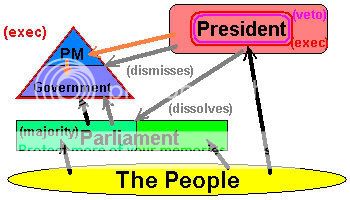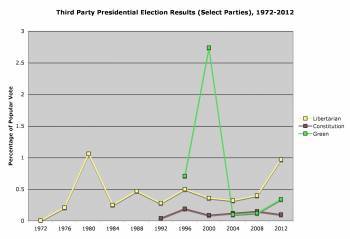
Upgrade to a Better Democracy: After reading John Amaruso’s excellent new article on Democracy Chronicles about the fixing the Constitution it occurred to me that my (very long) comment might make a good article. Plenty of good ideas exist for reforming our Constitution, some more bold than others. Let me mention a few suggestions that I’d make for the Constitution. I certainly don’t claim that this is a complete Constitution proposal. Just a few suggestions.
 The first thing to notice is that how we vote is quite irrelevant if we don’t have a legitimate vote-count. The vote-count, and therefore our elections, and therefore our government, won’t be legitimate unless it’s results are verifiable and verified. Therefore project #1 must be for Americans to demand a verifiable, and therefore legitimate, vote-count to be in place before the 2014 elections. Without that, no reform of any kind is possible.
The first thing to notice is that how we vote is quite irrelevant if we don’t have a legitimate vote-count. The vote-count, and therefore our elections, and therefore our government, won’t be legitimate unless it’s results are verifiable and verified. Therefore project #1 must be for Americans to demand a verifiable, and therefore legitimate, vote-count to be in place before the 2014 elections. Without that, no reform of any kind is possible.
One thing that the Green Party, Libertarian Party, and pretty much all non-Republocrat parties agree on is the elimination of the electoral college, ad its replacement by a popular vote, for electing presidents. I agree with that proposal. I agree that the allocation of senators and representatives by state, in the way that it’s done, is highly undemocratic too.
Redistricting and Gerrymandering
Seats for the senate and house of representatives should be given one to each equal-size district, rather than being allocated by state. No more “apportionment”. No more allocation of seats to states. Just divide the nation into congressional districts, without regard to states. Gerrymandering is ridiculous, and it’s astonishing that it’s tolerated. My suggestion: No more districting by officeholders’ whim. All districting should be by an automatic system with no human input.
 In one of my first Democracy Chronicles articles, I defined and proposed “Band-Rectangle districting”. I propose it now for the nation’s districting for house and senate seats. Nationally, without regard to states. Do we even need a senate? My understanding is that the senate is the result of the Great [bad] Compromise. If that’s the senate’s only purpose, then eliminate it. Just have one Congressional house, and call it simply “Congress”.
In one of my first Democracy Chronicles articles, I defined and proposed “Band-Rectangle districting”. I propose it now for the nation’s districting for house and senate seats. Nationally, without regard to states. Do we even need a senate? My understanding is that the senate is the result of the Great [bad] Compromise. If that’s the senate’s only purpose, then eliminate it. Just have one Congressional house, and call it simply “Congress”.
But I don’t claim to know whether the senate/house combinations serves a useful purpose. Is it desirable to have one house whose members serve for 4 years instead of 2, and to have a division of labor between two houses, wit the longer-term house dealing with the graver issues? I don’t know. My first impression is “No”. Just have one house, and call it “Congress”.
That would be my suggestion, though I’m not completely sure that there isn’t some merit in two houses. But simplicity is important, and I much prefer the great simplicity of dividing the country into Congress districts, pure and simple, instead of separate divisions into house and senate districts. My suggestion then: One congressional house, called “Congress”–unless there’s some very important reason for having two houses.
The GPUS, and some other progressive parties, advocate proportional representation. I don’t strenuously object to that, but I myself prefer single-member districts, as we have now (but with Band-Rectangle districting instead of gerrymandering). I don’t perceive any need or desirability in having parties in Congress that aren’t popular enough to win election in a single-member district. Therefore, though I don’t strenuously object to proportional representation, I don’t care for it either. Besides, proposing it amounts to asking the public to accept a change much bigger than just doing our single-winner elections in a better way.
Parliamentary government?
It is argued that, in parliamentary government, the executive can be replaced at any time by parliament. The experience in parliamentary countries is that the day-to-day running of a country requires the appointment of a whole government of ministers and their appointees, always co-ordinated on short-notice by the prime-minister, although the whole government is replaceable by Parliament. But in America today with adequate power of recall, the public can already replace any officeholder at any time on short notice too.

The president has too much power, and that problem has been increasing. Maybe parliamentary government avoid that, and, if that’s the only way to curb executive power, then it would be worth it. I feel that the chief executive shouldn’t be a branch of government unto himself/herself, but, rather should just be someone who is in charge of carrying out Congress’s policies, under close supervision by Congress. I don’t like one person having so much power at all.
So, even if the public elect a single-executive, that doesn’t mean that s/he should be a “branch of government”, or have the full executive power. Any directly publicly elected quick-decision executive would have too much power. What if s/he opposes Congress’ policies? How much sense would it then make for hir to be empowered to make quick decisions, including emergency decisions for Congress? A policy-opposition between hir and Congress could result in inefficiency and too much power to one person.

Therefore, maybe parliamentary government, would be better, with Congress choosing its quick-decision person. And the word “Congress” implies a branch of the government in the presidential system. Therefore, if we changed to the parliamentary system, we wouldn’t really have a Congress. We’d then have a Parliament instead. I like that. A new name for our new government’s decision making body: Parliament.
Even more democracy?
Perhaps the public, as a whole, should have the power to amend the Constitution, with some Constitutional-specified supermajority and waiting-period. Obviously the public should have full, easily accessed, powers of initiative and recall. That’s something that all of the non-Republocrat party platforms seem to agree on.
Constitutional amendment initiatives should merely have a supermajority requirement, and probably a waiting period, to avoid sudden emotional mistakes. But the easiest way to get a better Constitution is by voting Green, and getting their comprehensive improvements for America, which would include a better Constitution, better government, better voting system, etc.
Speaking of voting system, I’d like to add that I suggest that there should be a national voting system, and it should be Woodall’s method, as I’ve previously defined it here. The definition is brief, and so I’ll repeat it here. It starts with a definition of Instant Runoff (IRV), which uses rank balloting:
- IRV:
Repeatedly, cross off or delete from the rankings the candidate who currently tops the fewest rankings. (of course the winner is the last-remaining un-deleted candidate)
- Woodall:
Do IRV till only one member of the Smith set remains un-deleted. Elect hir.
- The smith set:
The Smith set is the smallest set of candidates who each beat every candidate outside the set. X beats Y if more voters rank X over Y than rank Y over X.
- A slightly more simply-defined, but not quite as choosy among the Smith set, method is Benham:
Do IRV till there is one un-eliminated candidate who beats each of the other un-eliminated candidates.
Woodall is better, because it’s more particular which Smith set member it chooses. I recommend Woodall for all political voting, including the election of the president, or other, lower-powered, chief executive, and for members of Congress, in single-member districts. Of course I also recommend Woodall for multi-alternative Initiatives and Referenda.
Party Platforms and the Green Party
Some of these proposals are the same with what the GPUS platform proposes, some of it is similar, and some of it is different. Making these suggestions doesn’t in any way mean that I don’t completely support the GPUS platform. These are just my own suggestions. But as a practical matter, proposals for changing our national policies, including those involving government, and including those that require Constitutional amendment, are, of course, what party platforms are about. Constitutional change proposals can be found in party platforms. When we choose a party platform, and vote for the nominees of that party, we thereby are choosing what kind of America we want.

I’ve often pointed out that with our Plurality voting system, the optimal strategy, when there are unacceptable candidates who could win, is to combine votes on the most winnable acceptable candidate. If you’re a progressive (someone who wants a government that is humane, egalitarian, and who has high standards for ethics, honesty and non-corruption), then surely “acceptable” means “progressive”. In that case, for you, Plurality’s strategy, when there are unacceptable candidates who could win, becomes:
Progressives should combine their votes on the most winnable progressive.
In my opinion, the candidate of the Green Party U.S. (GPUS) is, by any standard of measurement, the most winnable progressive candidate. So, voting for the Green nominee is the progressives’ optimal strategy in our Plurality elections. I suggest that the GPUS platform offers what most people say that they want (but they don’t know it, because parties other than the Democrats and Republicans (the two right wings of the Republocrat Party) are banned from media coverage. I suggest that the GPUs platform offers to fix the things that everyone is complaining about. If only they knew that.
I further suggest that, if everyone would read a few platforms, and then vote in their own perceived best interest, then the transition to a Green government would begin in 2014, and be complete in 2016. We could then expect the Constitutional changes offered in the GPUS platform.
Conclusion: Upgrade to a Better Democracy
My suggestion, then, is a Parliament, elected in single-member districts, with equal-population district lines drawn by Band-Rectangle districting, without regard to states, and with the winners chosen by Woodall’s method, a rank-balloting voting system.
Richard Fobes says
I agree that using a rank ballot makes sense.
The convoluted vote-counting method described here is unnecessarily complex. The criteria that the winner should beat each of the other candidates can more easily be achieved using a voting method that meets the “Condorcet criteria.”
Michael Ossipoff says
Richard Fobes wrote:
[quote]
I agree that using a rank ballot makes sense.
The convoluted vote-counting method described here is unnecessarily complex.
[/quote]
Woodall isn’t complex.
IRV, used by Woodall, has the brifest and simplest count rule of any rank method. I’ll repeat it here in the form that is relvant to Woodall:
Repeatedly, cross-off or delete from the rankings the candidate who tops the fewest rankings.
[end of IRV definition for Woodall]
Woodall, too, has a very brief definition:
Do IRV till only one member of the Smith set remains un-deleted. Elect hir.
[end of Woodall definition]
Smith set definiion:
The Smith set is the set of candidates such that every candidate in the set beats every candidate outside the set.
[end of Smith set definition]
As for the equally brief definition of “beat”, that is needed nearly all Condorcet criterion methods, including the one that Richard advocates:
X beats Y if more ballots rank X over Y than rank Y over X.
[end of “beat” definition]
So: The definition of Woodall need 4 extremely brief definitions:
1. IRV
2. Woodall
3. Smith sest
4. “Beat”
As I said, the definition of Benham (as opposed to Woodall), makes it a little briefer, because there’s no need to define the Smith set (even though Benham, too, will always choose from the Smith set):
Benham:
Do IRV till there’s an un-deleted candidate who beats each of the other un-deleted candidates. Elect hir.
[end of Benham definition]
So, for Benham, you need only 3 very brief definitions:
1. IRV
2. Benhalm
3. “Beats”
I doubt that Richard’s proposed rank-count, Kemeny, can be defined any more briefly than Woodlall, or especally Benham.
Additionally, Woodall and Benham can always be counted in polynomial time, while Kemeny’s count computation is NP-hard, and its count-time can increase horrendously as the number of candidates increasses.
Richard wrote:
[quote]
The criteria that the winner should beat each of the other candidates can more easily be achieved using a voting method that meets the “Condorcet criteria.”
[/quote]
That’s close to the definition of the Condorcet criterion for rank methods:
Condorcet Criterion for rank methods:
If there’s a candidate who beats each one of the other candidates, then s/he shoud win.
[end of Condorcet Critrerion definition]
Woodall and Benham both meet the Condorcet Criterion.
The Condorcet criterion can also be defined more generally, for universal applicability:
X is socially preferrred to Y if more voters prefer X to Y than Y to X.
If there i a candidate who is socially preferred to each one of the other candidates, and if everyone votes sincerely, then that candidate should win.
[end of universally-applicable Condorcet Criterion definition]
Of course Woodall and Benham meet the Condorcet criterion by that definition too.
So: Woodall, Benham, Kemeny and Schulze all meet the Condorcet criterion. They also all meet the important and valuable Mutual Majority Criterion (At least I think that Kemeny does).
But that isn’t enough, because, when there’s a chicken dilemma, compliance with the Mutual Majority Criterion becomes meaningless, because a chicken dilemma can disrupt and disband a mutual majority.
Woodall and Benham are free of chicken dilemma.
Kemeny and Schulze have the chicken dilemma.
Avoidng the chicken dilemma is so easily feasible for rank-methods, that there is no reason to consider, propose, or use a rank method that has the chicken dilemma.
Methods that meet the Mutual Majority Criterion and have no chicken dilemma achieve the greatest freedom from strategy-need, for a mutual majority. With such methods, the members of a mutual majority have no need to not rank sincerely. Sincere ranking is all that is needed for them to ensure that the winner will come from their mutual-majority-preferred-set.
Additionally, by meeting the Condorcet Criterion, Woodall and Benham also give the best protection possible to other majorities too.
Michael Ossipoff
Adrian Tawfik says
The section of this article on Presidential vs Parliamentary systems is very interesting to me. I think the American Presidential system is not our country’s biggest problem although the President is clearly too powerful today. Our system has been increasing the power of the President starting with the power to launch our nuclear weapons or start wars. Clearly Congress was supposed to have the power to declare war but modern communications and military technology has turned the system (designed in 1700s) on its head. What are the other options to limit the power of our President?
Michael Ossipoff says
Thanks fo the favorable comments. Yes, I hope that you’ll help to spread the word about the need for legitimate democracy.
The first thing we need, of course, is verifiable vote-counting in elections. Without that, there’s no democracy at all.
There should be pro-democracy demonstrations in front of elections department buildings, with ample video and TV coverage. Invite foreign visitors to video the demonstrations and take the video to their media at home.
People, anywhere, get exactly and only as much democracy as they insist on.
…at least hopefully they do. I can’t guarantee results, but if anyone wants to try, then the first thing to work on is verifiable vote-counting. It has been truly said that the real voting power belongs to him who counts the votes.
Michael Ossipoff.